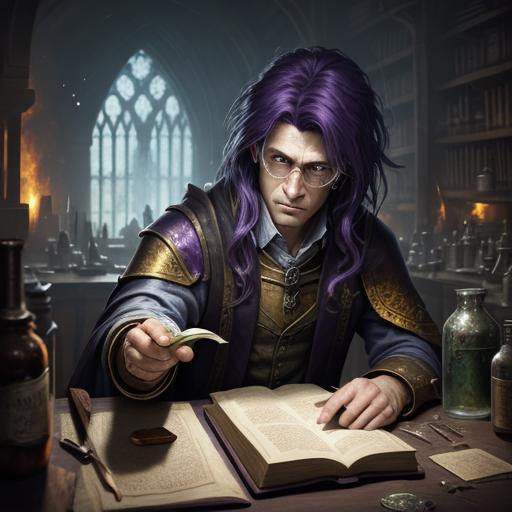School of Dabbling (5e Subclass)
School of Dabbling[edit]
Wizard Subclass
It's a bit of an inside joke to call Dabblers part of a "school". Unlike most wizard schools that focus on a particular type of magic or technique, Dabblers like to try a little bit of everything. Most of them considered several other schools of magic before deciding focus wasn't for them. These are the eccentric geniuses, the hyperactive minds that drop one task in the middle to start two more. Sameness is boring and boring is bad.
Dabblers (sometimes called "Manic Mages" or, more derogatorily, "Randos") tend to have messy, apparently disorganized spell books. In truth, the spells within are indexed and cross-referenced numerous times and places, a fact that adds to the apparent chaos. Any wizard other than a Dabbler will require extra time to copy from a Dabbler's spell book due to the amount of deciphering required. The spells within lack theme or commonality. In fact the main thing a Dabbler seeks in a spell is that it's different from the ones already in the book.
Their casting choices follow a similar pattern. While many wizards start every encounter with the same spell, a Dabbler likes to mix it up. And the next spell will be something completely different. Dabblers hate repetition. For that matter, concentration isn't usually their strong suit either. But what a Dabbler lacks in focus they make up for in variety and cleverness.
Curiosity Savant[edit]
Once you abandon pursuit of "proper" schools of magic and become a Dabbler at 2nd level, your curiosity about anything new accelerates your skill in transcription. When the spell school of a spell you copy into your spell book is different from the school of any other spell in your book of the same level, the required gold and time spent is one-fourth the normal amount.
Power in Variety[edit]
Also at 2nd level, you get more out of your spells when you mix them up. When you are in initiative, when you cast a spell of first level or higher that you have not cast during this initiative, add +1 to your spell save DC or spell attack modifier for that spell. This does not affect the first leveled-spell you cast during combat, but it will affect subsequent spells. You can add this modifier to a number of spells up to your intelligence modifier during an initiative. If you cast the same spell twice during this initiative, you can no longer benefit from this feature. You regain all uses of this feature the next time you roll initiative.
Thirst for Knowledge[edit]
At 6th level, your unquenchable thirst to learn new and unique things leads you to areas of magic other wizards seldom tread. You learn two spells from the Bard, Sorcerer, and/or Warlock spell lists that are not on the Wizard spell list: one level 1 and one level 2. These spells are not added to your spell book and do not count against your number of prepared Wizard spells. These spells are Wizard spells for you, however you can choose to cast them using Charisma instead of Intelligence as your spell casting ability. If you do cast them using Charisma, attack rolls are made with advantage and saving throws against them are made with disadvantage.
You learn one level 3 or 4 Thirst spell at 10th level and one of 5th or 6th level at 15th level. Thirst spells can only be swapped out at wizard levels that grant an ASI.
Different Strokes[edit]
Also at 6th level, you can use your bonus action to cast a cantrip that has a casting time of one action as long as you haven't cast that cantrip since you finished your last short or long rest. This can be done even if a leveled spell is cast with your action.
Flexible Focus[edit]
At 10th level, your inability to focus is offset by your readiness to switch your attention. When you lose concentration on a spell, you can use your reaction to cast a different concentration spell of lower level with a casting time of one action. You can do this once, regaining the ability when you finish a long rest. At 17th level, this resets at the end of a short rest.
Creative Casting[edit]
At 14th level, you discover that creativity is the foe of concentration. When you cast a spell that requires concentration, you can make one or more of the following adjustments to the spell:
- Increase or decrease the radius of the spell by 5 feet or 50% (whichever is less)
- Increase the range of the spell by 50%
- Change the damage type of the spell to cold, fire, lightning, poison, or thunder
- Increase damage rolls by 1d6
- Increase the spell save DC by +1
The price for these modifications is disadvantage on all concentration checks. Each additional adjustment beyond the first adds +2 to the DC of your concentration checks.
Back to Main Page → 5e Homebrew → Character Options → Subclasses

